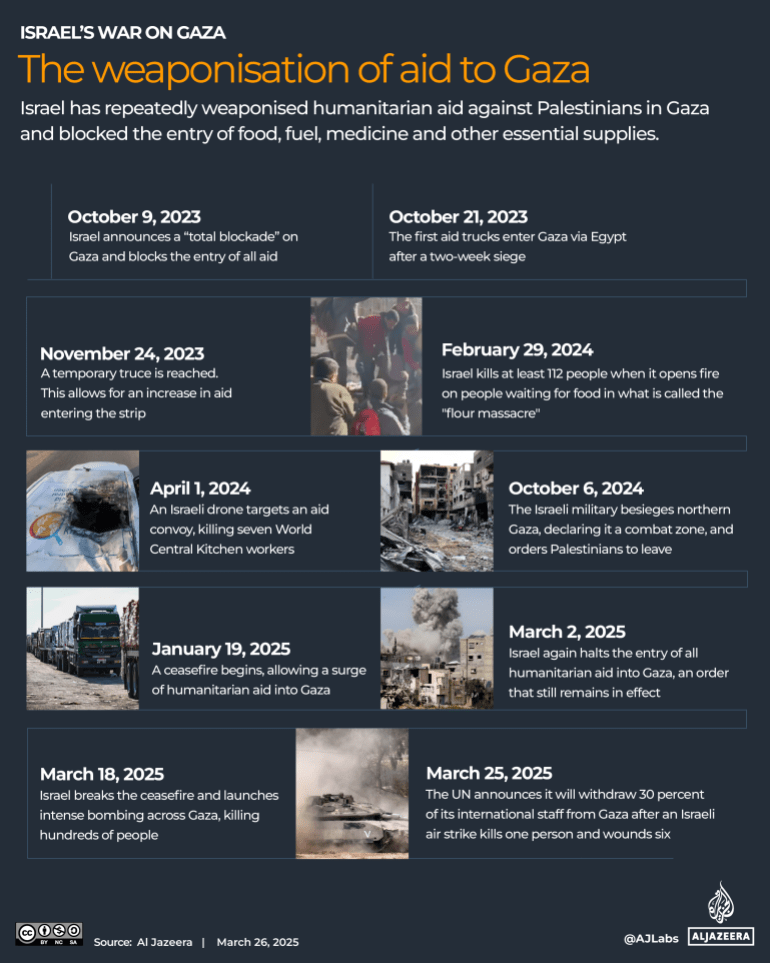According to the senior official of the organization, Hamas will no longer engage in ceasefire talks with Israel because they see no point in doing so as the Gaza Strip’s hunger war and extermination war continue.
The international community must be pressing Israeli Prime Minister Benjamin Netanyahu’s government to put an end to the “crimes of hunger, thirst, and killings” in Gaza, according to Basem Naim, who spoke to AFP news agency on Tuesday.
As long as the Gaza Strip’s hunger war and extermination war continue, he said, “there is no point in holding talks or considering new ceasefire proposals.”
Netanyahu said the enclave’s population would be “moved” in an upcoming expanded military operation by Israeli forces that would include “the conquest of the Gaza Strip and the holding of the territories.”
Since Israel’s occupation of the Palestinian enclave began, almost all of Gaza’s 2.3 million residents have been forced to flee.
total blockade
Since Israel imposed a total blockade on March 2 and since then, the humanitarian situation in the Gaza Strip has become even worse, with frequent food shortages and severe restrictions on aid access as Israel launches deadly attacks throughout the area.
According to Al Jazeera’s reporter from Deir el-Balah, Palestinians are “struggling to find food to feed their children,” with some “forced to eat expired or rotten food,” while others are unable to find any form of sustenance.
Food supplies in Gaza have now “completely run out,” according to the Palestine Red Crescent Society (PRCS) as of this week in both local markets and humanitarian distribution centers.
In its most recent situation update, the PRCS stated that “the population is once again in extreme danger of famine.” More than a million people who have been displaced are unable to meet even the smallest daily needs.
Because all previously stocked aid has run out, the PRCS claims that only “limited quantities of legumes” are currently being distributed to community kitchens.
The International Committee of the Red Cross (ICRC) echoed these concerns, warning against politicising humanitarian aid and urging immediate entry.
According to ICRC spokesman Christian Cardon, “the level of need among civilians in Gaza is overwhelming.”
According to international humanitarian law, Israel is required to use every means at its disposal to meet the basic needs of the country’s under-resourced citizens.
How can they talk about expanding military operations, asks Awad, 39, who lives in a tent in Khan Younis, in southern Gaza, on Monday? “Israel has not stopped the war, the killing, the bombing, the destruction, the siege, and the starvation, every day,” he said.
He said, “I call on the world to witness the famine that grows and spreads daily.”
Aya al-Skafy, a resident of Gaza City, reported to Al Jazeera on Monday that her baby had died last week due to malnourishment and medication shortages.
She weighed 2. 8 kg [6.2 lbs] when she was four months old. She experienced severe malnutrition, liver and kidney failure, and numerous other complications as a result of . She also experienced malnutrition, which caused her hair and nails to sag.
Israeli strategies
Despite numerous international appeals, Gaza is still severely restricted from receiving aid. The majority of border crossings into the area have been suspended for weeks, and only occasionally arranged convoys under strict Israeli control have been allowed.
Israel’s government reportedly wants to impose strict restrictions on how food is distributed in Gaza and has suggested that American companies should take over distribution from the UN and other humanitarian organizations.
Palestinian families would be able to transport one food parcel per week to designated southern Gaza hubs, and Israel would permit 60 trucks to enter the Gaza Strip daily, a mere one-tenth of what is required, according to experts.
Source: Aljazeera

Leave a Reply